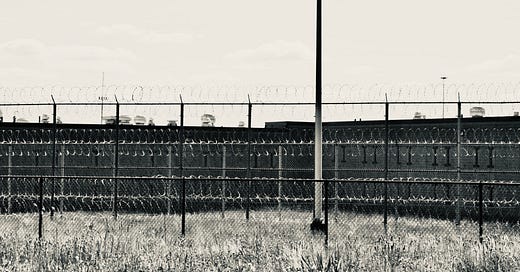A new report from The Sentencing Project demonstrates alarming data on long-term imprisonment
In Rhode Island, 15% of the prison population is serving life imprisonment - 238 people in total...
The Sentencing Project has released “A Matter of Life: The Scope and Impact of Life and Long-Term Imprisonment in the United States,” finding that one in six people in prison – nearly 200,000 people nationwide – are serving life sentences. The report examines the prevalence and implications of life sentences across the country, highlighting the disproportionate impact of such extreme sentences on people of color and the inefficacy of punitive measures in improving community safety.
Key findings from the 2025 report, using data from 2024, include:
The United States represents 40% of the world’s life-sentenced population despite comprising only 4% of the global population.
One in six individuals in prison (16%) – nearly 200,000 people – is serving a life sentence.
More people were serving life without parole in 2024 than ever: 56,245, a 68% increase since 2003.
Nearly half of individuals serving life sentences and more than half of those sentenced to life without parole are Black.
One in 11 women in prison is serving a life sentence.
Almost 70,000 individuals serving life committed their offenses before the age of 25.
People aged 55 and older account for nearly two-fifths of people serving life sentences.
“The United States’ heavy investment in extreme punishments, such as life imprisonment, is ineffective crime prevention,” said Kara Gotsch, Executive Director of The Sentencing Project. “Communities will not be safer unless we build stronger public health, education, and services for vulnerable people. The release of elderly and rehabilitated people from prison will not impact crime rates, but will reserve public dollars for more effective safety solutions.”
The data in the report on Rhode Island reveals that 15% of the State’s prison population is serving life imprisonment - 238 people in total. Four of them are women. By race, 39% are Black, 36% are white, 24% are Latino, and 5% are listed as “other.” To put that into context, only 9.3% of Rhode Islanders identify as Black, 82.4% identify as white, and 18% identify as Latino or Hispanic.
From the report:
“Although The Sentencing Project’s data alone cannot definitively prove causality, there is strong evidence that racism significantly affects the experiences of Black individuals in the criminal legal system, from initial system contact to sentencing and beyond. Research shows that Black children as young as age 10 are often perceived as older than they are, which affects how they are treated compared to white or Latino youth. Black children are less likely to be given the benefit of the doubt and are seen as more culpable for similar actions than their white and Latino peers. Such biased perceptions contribute to disparities in arrests, convictions, and sentencing outcomes. By the age of 23, 30% of Black males in America have been arrested, compared to 22% of non-Black males.53 It is possible that these factors contribute to the racial disparities we observe among those sentenced to LWOP as well.”
The “A Matter of Life” report provides several recommendations, including:
Abolish life without parole, which disregards the potential for rehabilitation;
Cap imprisonment at 20 years for adults and 15 years for youth, except in rare circumstances;
Implement sentence review mechanisms to evaluate and adjust sentences after 10 years of incarceration; and,
Reform the parole systems to ensure fair assessments based on individual transformation and community safety.
“This report is a temperature check on our criminal legal system, and it tells us that policymakers must champion more substantial reforms to achieve fairness and efficacy,” said Celeste Barry, Program Associate at The Sentencing Project and co-author of the report. “Extreme sentences neither promote community safety nor acknowledge the potential for change that so many people undergo, especially as they age. It is time to adopt policies prioritizing justice, second chances, and more effective approaches to preventing crime.”





Reform won’t just happen without strong programs within prison. Also there needs to be re-entry programs and parole that really has oversight. People in prison are individuals, some will not be a threat to public safety when released, some will always be a threat. It’s not cheap or politically easy to really invest in reform but too many people are locked up.